权利法案the bill of rights
美国权利法案
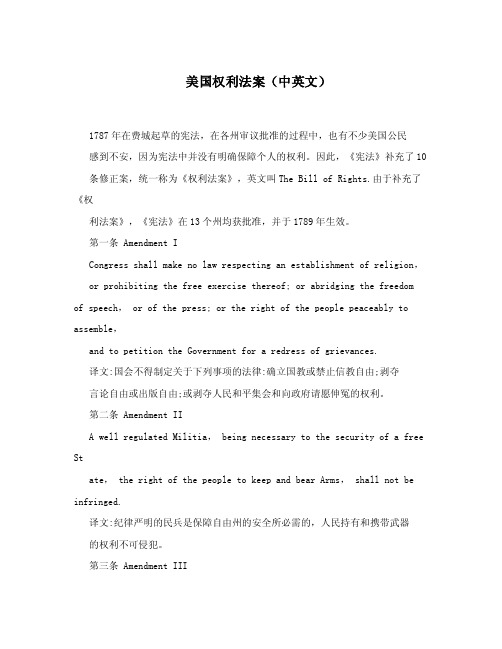
美国权利法案(中英文)1787年在费城起草的宪法,在各州审议批准的过程中,也有不少美国公民感到不安,因为宪法中并没有明确保障个人的权利。
因此,《宪法》补充了10 条修正案,统一称为《权利法案》,英文叫The Bill of Rights.由于补充了《权利法案》,《宪法》在13个州均获批准,并于1789年生效。
第一条 Amendment ICongress shall make no law respecting an establishment of religion,or prohibiting the free exercise thereof; or abridging the freedomof speech, or of the press; or the right of the people peaceably to assemble,and to petition the Government for a redress of grievances.译文:国会不得制定关于下列事项的法律:确立国教或禁止信教自由;剥夺言论自由或出版自由;或剥夺人民和平集会和向政府请愿伸冤的权利。
第二条 Amendment IIA well regulated Militia, being necessary to the security of a free State, the right of the people to keep and bear Arms, shall not be infringed.译文:纪律严明的民兵是保障自由州的安全所必需的,人民持有和携带武器的权利不可侵犯。
第三条 Amendment IIINo Soldier shall, in time of peace be quartered in any house, with out the consent of the Owner, nor in time of war, but in a manner tobe prescribed by law.译文:未经房主同意,士兵平时不得驻扎在任何住宅;除依法律规定的方式,战时也不得驻扎。
权利法案

发展历史
1787年美国宪法草案提交各州立法机构批准时,有些人提出了宪法无法保障人民基本权利的疑虑(很多人都 持怀疑态度,甚至敌视,当时问世的7条正文,没有一条是保障公民人身自由与安全的人权条款)。对此,支持宪 法草案的美国联邦党人向美国人民保证,将会在第一届国会会期时在宪法中加入权利法案。同时杰弗逊等人奔走 呼吁,要求在宪法中增加包括信仰自由、出版自由、陪审制度等人权条款。以保证“生命权、自由权和追求幸福 之权”(独立宣言)。
权利法案包括了言论、新闻、宗教与集社等方面的自由与权利。权利法案也向美国人民保证,权利法案中所 列出的权利并不是美国人民所能够享有的全部权利,而仅仅是人民所拥有的最重要的权利。
1789年最初有12条修正案被提出,但其中2条未能通过。1791年12月15日,其余的10条修正案获得通过,成 为现在所称的《权利法案》。权利法案草案中的第11条在1992年最终获得批准,成为宪法第27条修正案。这条修 正案禁止国会随意提高对议员的薪酬。理论上说,第12条的权利法案草案依然在讨论中,但是不太可能获得通过。
影响与评价
《权利法案》的第一条,即美国宪法第一修正案对美国影响巨大。美国媒体所享有的一切自由都源于此,在 美国,凡是涉及言论、新闻、出版等诉讼,往往都会搬出此,它几乎成为美国媒体或个人言论自由的护身符,不 可动摇。以至于美国人把它颂扬为“美国生活方式”的主要内容。但是《权利法案》没有修正宪法的一个重大缺 陷,即对奴隶制的确认,这使后来的南方地区农奴制扩张大大增长。
译文:国会不得制定关于下列事项的法律:确立国教或禁止信教自由;剥夺言论自由或出版自由;或剥夺人 民和平集会和向政府请愿伸冤的权利。
第二条 (Amendment II)
A well regulated Militia being necessary to the security of a free State, the right of the people to keep and bear Arms shall not be infringed.
英国权利法案全文

权利法案《权利法案》(the Bill of Rights),全称《国民权利与自由和王位继承宣言》(An Act Declaring the Rights and Liberties of the Subject and Settling the Succession of the Crown),是英国资产阶级革命中的重要法律文件,奠定了英国君主立宪政体的理论和法律基础,确立了议会高于王权的原则,具有宪法的性质,标志着君主立宪制开始在英国建立,为英国资本主义的迅速发展扫清了道路。
正文:国会两院经依法集会于西敏寺宫,为确保英国人民传统之权利与自由而制定本法律。
1.凡未经国会同意,以国王权威停止法律或停止法律实施之僭越权力。
2.近来以国王权威擅自废除法律或法律实施之僭越权力,为非法权力。
3.设立审理宗教事务之钦差法庭之指令,以及一切其他同类指令与法庭,皆为非法而有害4.凡未经国会准许,借口国王特权,为国王而征收,或供国王使用而征收金钱,超出国会准许之时限或方式者,皆为非法。
5.向国王请愿,乃臣民之权利,一切对此项请愿之判罪或控告,皆为非法。
6.除经国会同意外,平时在本王国内征募或维持常备军,皆属违法。
7.凡臣民系新教徒者,为防卫起见,得酌量情形,并在法律许可范围内,置备武器。
8.国会议员之选举应是自由的。
9.国会内之演说自由、辩论或议事之自由,不应在国会以外之任何法院或任何地方,受到弹劾或讯问。
10.不应要求过多的保释金,亦不应强课过分之罚款,更不应滥施残酷非常之刑罚。
11.陪审官应予正式记名列表并陈报之,凡审理叛国犯案件之陪审官应为自由世袭地领有人。
12.定罪前,特定人的一切让与及对罚金与没收财产所做的一切承诺,皆属非法而无效。
13.为申雪一切诉冤,并为修正、加强与维护法律起见,国会应时常集会。
彼等(即灵俗两界贵族与众议员等)并主张、要求与坚持上述各条为彼等无可置疑之权利与自由;凡上开各条中有损人民之任何宣告、判决、行为或诉讼程序,今后断不应据之以为结论或先例。
权利法案(美国)-the Bill of Rights(中英文)

权利法案(美国)(中英文)1787年在费城起草的宪法,在各州审议批准的过程中,也有不少美国公民感到不安,因为宪法中并没有明确保障个人的权利。
因此,《宪法》补充了10条修正案,统一称为《权利法案》,英文叫The Bill of Rights。
由于补充了《权利法案》,《宪法》在13个州均获批准,并于1789年生效。
(左下图:美国威廉姆斯堡总督府的一个小会议室,就是《弗吉尼亚州权利法案》-后来成为美国宪法中《权利法案》蓝本的制定地) 第一条 Amendment II . F reedom of Speech, Press, Religion and Petition Congress shall make no law respecting an establishment of religion, or prohibiting the free exercise thereof; or abridging the freedom of speech, or of the press; or the right of the people peaceably to assemble, and to petition the Government for a redress of grievances. 译文:国会不得制定关于下列事项的法律:确立国教或禁止信教自由;剥夺言论自由或出版自由;或剥夺人民和平集会和向政府请愿伸冤的权利。
第二条 Amendment IIII . Right to keep and bear arms A well regulated Militia, being necessary to the security of a free State, the right of the people to keep and bear Arms, shall not be infringed. 译文:纪律严明的民兵是保障自由州的安全所必需的,人民持有和携带武器的权利不可侵犯。
英 美权利法案

The Bill of Rights,即《权利法案》,又译《人权法案》,指的是美国宪法中第一至第十条宪法修正案,由詹姆斯·麦迪逊起草,1791年12月15日,获得通过。
权利法案的10条修正案包括:第一条:言论、宗教、和平集会自由;第二条:持有与佩戴武器的权利;第三条:免于民房被军队征用;第四条:免于不合理的搜查与扣押;第五条:正当程序(Due Process)、一罪不能两判、禁止逼供、禁止剥夺私人财产;第六条:未经陪审团不可定罪以及剥夺被控告方的其他权利;第七条:民事案件中要求陪审团的权利;第八条:禁止过度罚金与酷刑;第九条:未被列入的其他权利同样可以受到保护;第十条:人民保留未经立法的权利。
影响与评价《权利法案》的第一条,即美国宪法第一修正案对美国影响巨大。
美国媒体所享有的一切自由都源于此,在美国,凡是涉及言论、新闻、出版等诉讼,往往都会搬出此,它几乎成为美国媒体或个人言论自由的护身符,不可动摇。
以至于美国人把它颂扬为“美国生活方式”的主要内容。
[1]但是《权利法案》没有修正宪法的一个重大缺陷,即对奴隶制的确认,这使后来的南方地区农奴制扩张大大增长。
[2]第一条(Amendment I)Congress shall make no law respecting an establishment of religion, or prohibiting the free exercise thereof; or abridging the freedom of speech, or of the press; or the right of the people peaceably to assemble, and to petition the Government for a redress of grievances.译文:国会不得制定关于下列事项的法律:确立国教或禁止信教自由;剥夺言论自由或出版自由;或剥夺人民和平集会和向政府请愿伸冤的权利。
英国《权利法案》介绍
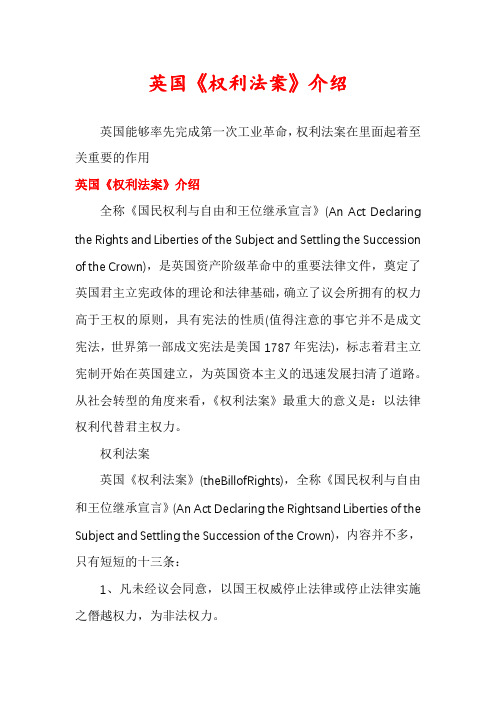
英国《权利法案》介绍英国能够率先完成第一次工业革命,权利法案在里面起着至关重要的作用英国《权利法案》介绍全称《国民权利与自由和王位继承宣言》(An Act Declaring the Rights and Liberties of the Subject and Settling the Succession of the Crown),是英国资产阶级革命中的重要法律文件,奠定了英国君主立宪政体的理论和法律基础,确立了议会所拥有的权力高于王权的原则,具有宪法的性质(值得注意的事它并不是成文宪法,世界第一部成文宪法是美国1787年宪法),标志着君主立宪制开始在英国建立,为英国资本主义的迅速发展扫清了道路。
从社会转型的角度来看,《权利法案》最重大的意义是:以法律权利代替君主权力。
权利法案英国《权利法案》(theBillofRights),全称《国民权利与自由和王位继承宣言》(An Act Declaring the Rightsand Liberties of the Subject and Settling the Succession of the Crown),内容并不多,只有短短的十三条:1、凡未经议会同意,以国王权威停止法律或停止法律实施之僭越权力,为非法权力。
2、近来以国王权威擅自废除法律或法律实施之僭越权力,为非法权力。
3、设立审理宗教事务之钦差法庭之指令,以及一切其他同类指令与法庭,皆为非法而有害。
4、凡未经国会准许,借口国王特权,为国王而征收,或供国王使用而征收金钱,超出国会准许之时限或方式者,皆为非法。
5、向国王请愿,乃臣民之权利,一切对此项请愿之判罪或控告,皆为非法。
6、除经国会同意外,平时在本王国内征募或维持常备军,皆属违法。
7、凡臣民系新教徒者,为防卫起见,得酌量情形,并在法律许可范围内,置备武器。
8、议会之选举应是自由的。
9、国会内之演说自由、辩论或议事之自由,不应在国会以外之任何法院或任何地方,受到弹劾或讯问。
权利法案
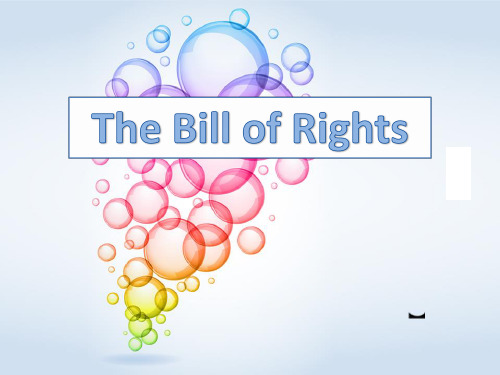
1、凡未经议会同意,以国王权威停止法律或停止法律 实施之僭越权力,为非法权利。(立法权) 3.设立审理宗教事务之钦差法庭之指令,以及一切其 他同类指令与法庭,皆为非法而有害。 (司法权) 4.凡未经国会准许,借口国王特权,为国王而征收, 或供国王使用而征收金钱,超出国会准许之时限或方式 者,皆为非法。(征税权) 6.除经国会同意外,平时在本王国内征募或维持常备 军,皆属违法。(军事权)
The bill of rights,在英国习惯称作 《权利法案》(1791年),而美国习惯 称作《人权法案》(1689年)。
英国《权利法案》背景:光荣革命
1688年,英国资产阶级和新贵族发动 的推翻詹姆斯二世的统治、防止天主 教复辟的非暴力政变。英国决定以法 律形式限制国王的权力,保证自己的 权力,于是在议会上、下两院共同召 开的全体会议上,向威廉和玛丽提出 了一个“权利宣言”.1689年10月,议 会通过了“权利宣言”并制订为法律, 是为《权利法案》。 这场革命未有流血,因此历史学家将 其称之为“光荣革命”。奠定了英国 君主立宪政体的理论和法律基础,确 立了议会高于王权的原则,具有宪法 的性质,标志着君主立宪制开始在英 国建立,为英国资本主义的迅速发展 扫清了道路。
By raising and keeping a standing army within this kingdom in time of peace without consent of Parliament, and quartering soldiers contrary to law; By causing several good subjects being Protestants to be disarmed at the same time when papists were both armed and employed contrary to law;
英国《权利法案》的内容及意义
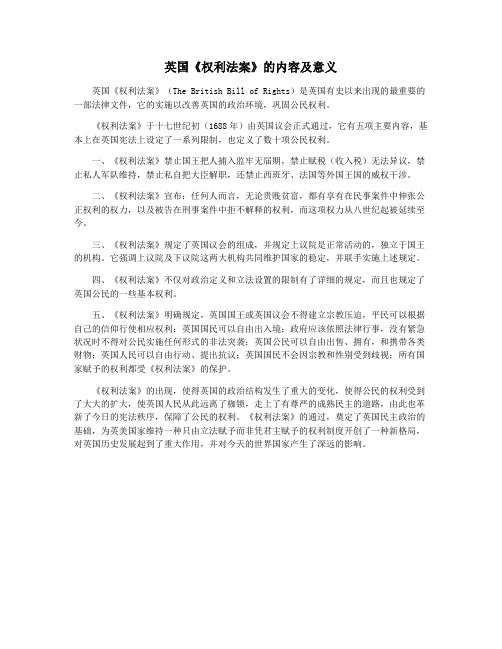
英国《权利法案》的内容及意义英国《权利法案》(The British Bill of Rights)是英国有史以来出现的最重要的一部法律文件,它的实施以改善英国的政治环境,巩固公民权利。
《权利法案》于十七世纪初(1688年)由英国议会正式通过,它有五项主要内容,基本上在英国宪法上设定了一系列限制,也定义了数十项公民权利。
一、《权利法案》禁止国王把人捕入监牢无届期,禁止赋税(收入税)无法异议,禁止私人军队维持,禁止私自把大臣解职,还禁止西班牙、法国等外国王国的威权干涉。
二、《权利法案》宣布:任何人而言,无论贵贱贫富,都有享有在民事案件中伸张公正权利的权力,以及被告在刑事案件中拒不解释的权利,而这项权力从八世纪起被延续至今。
三、《权利法案》规定了英国议会的组成,并规定上议院是正常活动的,独立于国王的机构。
它强调上议院及下议院这两大机构共同维护国家的稳定,并联手实施上述规定。
四、《权利法案》不仅对政治定义和立法设置的限制有了详细的规定,而且也规定了英国公民的一些基本权利。
五、《权利法案》明确规定,英国国王或英国议会不得建立宗教压迫,平民可以根据自己的信仰行使相应权利;英国国民可以自由出入境;政府应该依照法律行事,没有紧急状况时不得对公民实施任何形式的非法突袭;英国公民可以自由出售、拥有,和携带各类财物;英国人民可以自由行动、提出抗议;英国国民不会因宗教和性别受到歧视;所有国家赋予的权利都受《权利法案》的保护。
《权利法案》的出现,使得英国的政治结构发生了重大的变化,使得公民的权利受到了大大的扩大,使英国人民从此远离了枷锁,走上了有尊严的成熟民主的道路,由此也革新了今日的宪法秩序,保障了公民的权利。
《权利法案》的通过,奠定了英国民主政治的基础,为英美国家维持一种只由立法赋予而非凭君主赋予的权利制度开创了一种新格局,对英国历史发展起到了重大作用,并对今天的世界国家产生了深远的影响。
权利法案
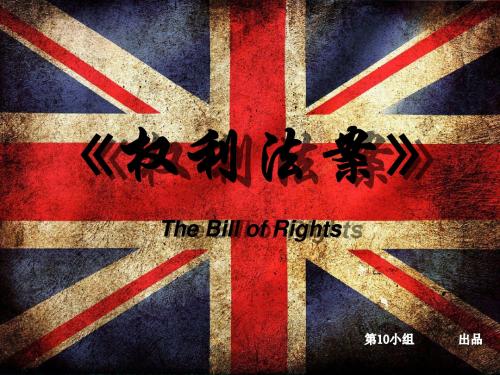
《权利法案》是英国资产阶级、新 贵族与封建势力的妥协,它在一定 程度上赋予人民一定的民主权利, 体现了一定程度的民主性与进步性。 英国确立的是君主立宪制,《权利 法案》为限制王权提供了宪法保证。 但反封建不够彻底,存在一定程度 的保守性。
The end…
7、凡臣民系新教徒者,为防卫起见,得酌量情形, 并在法律许可范围内,置备武器。 8、议会之选举应是自由的。 9、国会内之演说自由、辩论或议事之自由,不应在 国会以外之任何法院或任何地方,受到弹劾或讯问。 10、不应要求过多的保释金,亦不应强课过分之罚款, 更不应滥施残酷非常之刑罚案件之陪审官应为自由世袭地领有人。 12、定罪前,特定人的一切让与及对罚金与没收财产 所做的一切承诺,皆属非法而无效。 13、为申雪一切诉冤,并为修正、加强与维护法律起 见,国会应时常集会。
《权利法案》
The Bill of Rights
1688年,英国资产阶级和新贵族发动 的推翻詹姆斯二世的统治、防止天主教复辟 的非暴力政变。这场革命未有流血,因此历 史学家将其称之为“光荣革命”。君主立宪 制政体即起源于这次光荣革命。
限制国王的权力
1.为限制国王的权力提供的法律保障。
2.确立了议会的权力。 3.英国从此确立了君主立宪制的资产阶级统 治。 4、国王日益处于“统而不治”的地位 从社会转型的角度来看,《权利法案》最重 大的意义是:以法律权利代替君主权力。
1、凡未经议会同意,以国王权威停止法律或停止法律实施 之僭越权力,为非法权力。 2、近来以国王权威擅自废除法律或法律实施之僭越权力, 为非法权力。 3、设立审理宗教事务之钦差法庭之指令,以及一切其他同 类指令与法庭,皆为非法而有害。 4、凡未经国会准许,借口国王特权,为国王而征收,或供 国王使用而征收金钱,超出国会准许之时限或方式者,皆为 非法。 5、向国王请愿,乃臣民之权利,一切对此项请愿之判罪或 控告,皆为非法。 6、除经国会同意外,平时在本王国内征募或维持常备军, 皆属违法。
1689年《权利法案》

1689年《权利法案》
1689年的《权利法案》(Bill of Rights)是英国历史上的一部重要法律文件,标志着英国君主立宪制的确立。
以下是对该法案的简要介绍:
背景:在英国历史上,长期存在君主专制统治的倾向,国王拥有较大的权力,在没有民众代表的情况下行使着极大的权威。
然而,在17世纪末,英国爆发了一系列政治冲突,包括光荣革命。
主要内容:1689年《权利法案》的主要目的是约束君主的权力,确立议会的主权,并为公民确立基本权利。
该法案有以下重要内容:
1.君主制约:该法案规定,君主不能单方面制定或废除法律、
征收税收或决定军事行动,只能在议会的允许下行使权力。
2.议会权力:该法案明确规定国会拥有立法权,对法律的制定
和修改具有最终决定权。
3.言论自由:该法案保障了议会成员的言论自由,允许议员自
由表达意见,以便能够以公正和有效的方式参与国家事务。
4.宗教自由:该法案废除了国王的宗教特权,保障了公民的信
仰自由,禁止迫害持不同宗教信仰的人。
5.武装权:该法案规定,英国公民有权持有武器,以保护个人
和家庭安全。
影响:《权利法案》的通过标志着英国从君主专制向君主
立宪制转变的重要里程碑。
它确保了议会的主权,限制了君主的权力,并为个人赋予了一系列基本权利,包括言论自由、宗教自由和个人自由。
这些原则深刻影响了近代民主国家的发展,成为后来英美法律制度和宪政思想的重要基石。
《权利法案》在当时主要适用于英格兰和苏格兰,而对爱尔兰的影响较小。
此外,该法案的内容也是历经时间演变和修订的,通过了一系列相关法律和法案来进一步完善和细化其中的内容。
英美国家概况:权利法案The Bill Of Rights
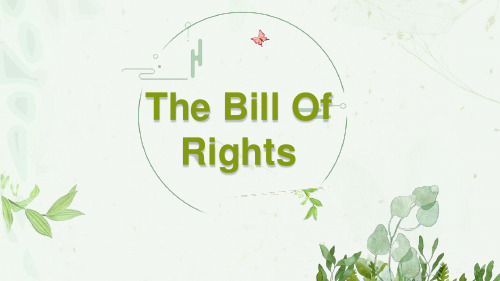
The right of the people to be secure in their persons, houses, papers, and effects, against unreasonable searches and seizures, shall not be violated, and no Warrants shall issue, but upon probable cause, supported by Oath or affirmation, and particularly describing the place to be searched, and the persons or things to be seized.
Contents
PART 02
Amendment I Freedom of Speech. Press, Religion and Pettion
Congress shall make no law respecting an establishment of religion, or prohibiting the free exercise thereof; or abridging the freedom of speech, or of the press; or the right of the people peaceably to assemble, and to petition the Government for a redress of grievances.
Amendment V
Provisons conceming prosecution
美国权利法案
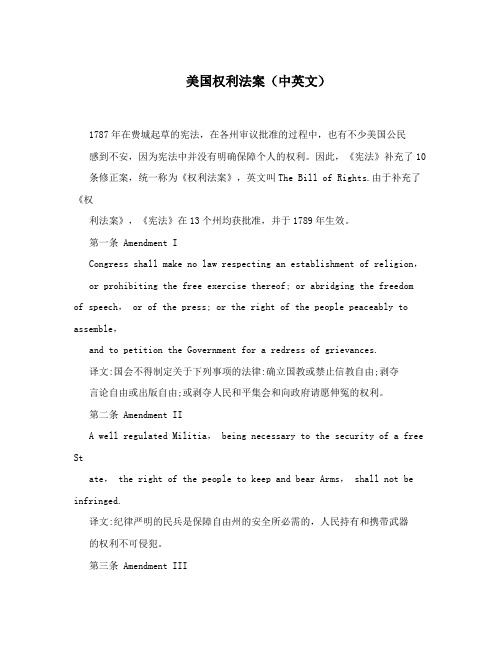
美国权利法案(中英文)1787年在费城起草的宪法,在各州审议批准的过程中,也有不少美国公民感到不安,因为宪法中并没有明确保障个人的权利。
因此,《宪法》补充了10 条修正案,统一称为《权利法案》,英文叫The Bill of Rights.由于补充了《权利法案》,《宪法》在13个州均获批准,并于1789年生效。
第一条 Amendment ICongress shall make no law respecting an establishment of religion,or prohibiting the free exercise thereof; or abridging the freedomof speech, or of the press; or the right of the people peaceably to assemble,and to petition the Government for a redress of grievances.译文:国会不得制定关于下列事项的法律:确立国教或禁止信教自由;剥夺言论自由或出版自由;或剥夺人民和平集会和向政府请愿伸冤的权利。
第二条 Amendment IIA well regulated Militia, being necessary to the security of a free State, the right of the people to keep and bear Arms, shall not be infringed.译文:纪律严明的民兵是保障自由州的安全所必需的,人民持有和携带武器的权利不可侵犯。
第三条 Amendment IIINo Soldier shall, in time of peace be quartered in any house, with out the consent of the Owner, nor in time of war, but in a manner tobe prescribed by law.译文:未经房主同意,士兵平时不得驻扎在任何住宅;除依法律规定的方式,战时也不得驻扎。
权利法案1791

权利法案(美国)(中英文)东方法眼按:1787年在费城起草的宪法,在各州审议批准的过程中,也有不少美国公民感到不安,因为宪法中并没有明确保障个人的权利。
因此,《宪法》补充了10条修正案,统一称为《权利法案》,英文叫The Bill of Rights。
由于补充了《权利法案》,《宪法》在13个州均获批准,并于1791年生效。
第一条Amendment ICongress shall make no law respecting an establishment of religion, or prohibiting the free exercise thereof; or abridging the freedom of speech, or of the press; or the right of the people peaceably to assemble, and to petition the Government for a redress of grievances.译文:国会不得制定关于下列事项的法律:确立国教或禁止信教自由;剥夺言论自由或出版自由;或剥夺人民和平集会和向政府请愿伸冤的权利。
第二条Amendment IIA well regulated Militia, being necessary to the security of a free State, the right of the people to keep and bear Arms, shall not be infringed.译文:纪律严明的民兵是保障自由州的安全所必需的,人民持有和携带武器的权利不可侵犯。
第三条Amendment IIINo Soldier shall, in time of peace be quartered in any house, without the consent of the Owner, nor in time of war, but in a manner to be prescribed by law.译文:未经房主同意,士兵平时不得驻扎在任何住宅;除依法律规定的方式,战时也不得驻扎。
the bill of rights of 1689 名词解释
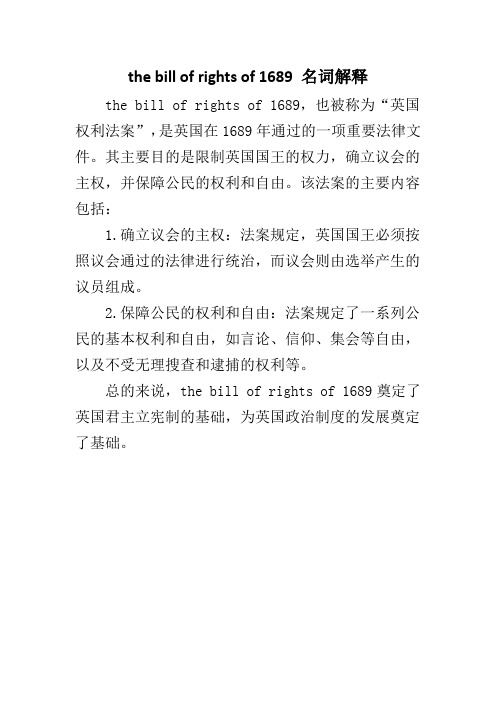
the bill of rights of 1689 名词解释the bill of rights of 1689,也被称为“英国权利法案”,是英国在1689年通过的一项重要法律文件。
其主要目的是限制英国国王的权力,确立议会的主权,并保障公民的权利和自由。
该法案的主要内容包括:
1.确立议会的主权:法案规定,英国国王必须按照议会通过的法律进行统治,而议会则由选举产生的议员组成。
2.保障公民的权利和自由:法案规定了一系列公民的基本权利和自由,如言论、信仰、集会等自由,以及不受无理搜查和逮捕的权利等。
总的来说,the bill of rights of 1689奠定了英国君主立宪制的基础,为英国政治制度的发展奠定了基础。
《自由大宪章》和《1689权利法案》的对比

《自由大宪章》和《1689权利法案》的对比一.序言《自由大宪章》与《权利法案》。
二者同为英国柔性宪法中重要的组成部分,充当着这个无宪法而有宪政国家的宪法体系中不可或缺的法律文件。
二.正文1关于两篇文献名称的对比自由大宪章:the Magna Carta(The Great Charter)《权利法案》(theBill of Rights),全称《国民权利与自由和王位继承宣言》(An Act Declaring theRights and Liberties of the Subject andSettling the Succession ofthe Crown)自由大宪章(The MagnaCarta)的中文解释为大宪章;保障人民权利与自由的法令;(TheGreat Charter)而《权利法案》的简称则是权利的法案,全称如上,总而言之包括两方面的内容。
其一是国民的权利与自由,其二是王位继承宣言。
对比两份宪法性文件的名称,不难看出,权利与自由是一脉相承的核心,而限制王权则直接出现在标题中;不难看出君主的权威一直被削弱,而权利与自由始终被保障。
5.关于法条的具体剖析分析的角度有君主权力的来源(权力哪里来)权力的行使与制衡(谁来行使如何分权)权利的范围(权利怎么用)Ps:此处引用王世杰先生《比较宪法》中的对宪法的的定义:调整国家权力和公民权利的根本大法。
国家权力(君权以及君权的分野)对比如下1. 权利的来源《大宪章》中国王权力的来源:君权神授,参照原文第一段:受命于天的英格兰国王……但此时出现了贵族对国王制衡。
《权利法案》中,没有明确的律法说明权利的来源,参照光荣革命的历史,英王夫妇是议会选择的,此时权利颇有民授的意味。
值得一提,《大宪章》中国王仍要向罗马教廷致敬,后者则忠于国教,可见英国在这个渐变的过程中,实现了宗教独立政教合一。
权力由神圣走向世俗,为民主提供了保障。
2. 文件中的主体《自由大宪章》中,履行契约的主体范围十分广泛,从国王贵族教士乃至自由民和敌国的商人平民,都有提及。
权利法案(美国)-the Bill of Rights(中英文)

权利法案(美国)(中英文)1787年在费城起草的宪法,在各州审议批准的过程中,也有不少美国公民感到不安,因为宪法中并没有明确保障个人的权利。
因此,《宪法》补充了10条修正案,统一称为《权利法案》,英文叫The Bill of Rights。
由于补充了《权利法案》,《宪法》在13个州均获批准,并于1789年生效。
(左下图:美国威廉姆斯堡总督府的一个小会议室,就是《弗吉尼亚州权利法案》-后来成为美国宪法中《权利法案》蓝本的制定地) 第一条 Amendment II . F reedom of Speech, Press, Religion and Petition Congress shall make no law respecting an establishment of religion, or prohibiting the free exercise thereof; or abridging the freedom of speech, or of the press; or the right of the people peaceably to assemble, and to petition the Government for a redress of grievances. 译文:国会不得制定关于下列事项的法律:确立国教或禁止信教自由;剥夺言论自由或出版自由;或剥夺人民和平集会和向政府请愿伸冤的权利。
第二条 Amendment IIII . Right to keep and bear arms A well regulated Militia, being necessary to the security of a free State, the right of the people to keep and bear Arms, shall not be infringed. 译文:纪律严明的民兵是保障自由州的安全所必需的,人民持有和携带武器的权利不可侵犯。
权利法案_美国__中英文_
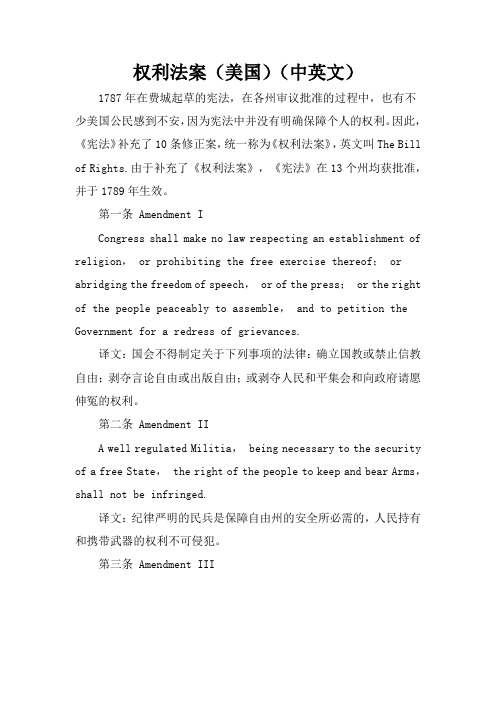
权利法案(美国)(中英文)1787年在费城起草的宪法,在各州审议批准的过程中,也有不少美国公民感到不安,因为宪法中并没有明确保障个人的权利。
因此,《宪法》补充了10条修正案,统一称为《权利法案》,英文叫The Bill of Rights.由于补充了《权利法案》,《宪法》在13个州均获批准,并于1789年生效。
第一条 Amendment ICongress shall make no law respecting an establishment of religion, or prohibiting the free exercise thereof; or abridging the freedom of speech, or of the press; or the right of the people peaceably to assemble, and to petition the Government for a redress of grievances.译文:国会不得制定关于下列事项的法律:确立国教或禁止信教自由;剥夺言论自由或出版自由;或剥夺人民和平集会和向政府请愿伸冤的权利。
第二条 Amendment IIA well regulated Militia, being necessary to the security of a free State, the right of the people to keep and bear Arms,shall not be infringed.译文:纪律严明的民兵是保障自由州的安全所必需的,人民持有和携带武器的权利不可侵犯。
第三条 Amendment IIINo Soldier shall, in time of peace be quartered in any house, without the consent of the Owner, nor in time of war,but in a manner to be prescribed by law.译文:未经房主同意,士兵平时不得驻扎在任何住宅;除依法律规定的方式,战时也不得驻扎。
权利法案_美国__中英文_

权利法案(美国)(中英文)1787年在费城起草的宪法,在各州审议批准的过程中,也有不少美国公民感到不安,因为宪法中并没有明确保障个人的权利。
因此,《宪法》补充了10条修正案,统一称为《权利法案》,英文叫The Bill of Rights.由于补充了《权利法案》,《宪法》在13个州均获批准,并于1789年生效。
第一条 Amendment ICongress shall make no law respecting an establishment of religion, or prohibiting the free exercise thereof; or abridging the freedom of speech, or of the press; or the right of the people peaceably to assemble, and to petition the Government for a redress of grievances.译文:国会不得制定关于下列事项的法律:确立国教或禁止信教自由;剥夺言论自由或出版自由;或剥夺人民和平集会和向政府请愿伸冤的权利。
第二条 Amendment IIA well regulated Militia, being necessary to the security of a free State, the right of the people to keep and bear Arms,shall not be infringed.译文:纪律严明的民兵是保障自由州的安全所必需的,人民持有和携带武器的权利不可侵犯。
第三条 Amendment IIINo Soldier shall, in time of peace be quartered in any house, without the consent of the Owner, nor in time of war,but in a manner to be prescribed by law.译文:未经房主同意,士兵平时不得驻扎在任何住宅;除依法律规定的方式,战时也不得驻扎。
- 1、下载文档前请自行甄别文档内容的完整性,平台不提供额外的编辑、内容补充、找答案等附加服务。
- 2、"仅部分预览"的文档,不可在线预览部分如存在完整性等问题,可反馈申请退款(可完整预览的文档不适用该条件!)。
- 3、如文档侵犯您的权益,请联系客服反馈,我们会尽快为您处理(人工客服工作时间:9:00-18:30)。
June 4, 2014 The Bill of Rights: A TranscriptionThe Preamble to The Bill of RightsCongress of the United Statesbegun and held at the City of New-York, onWednesday the fourth of March, one thousand seven hundred and eighty nine.THE Conventions of a number of the States, having at the time of their adopting the Constitution, expressed a desire, in order to prevent misconstruction or abuse of its powers, that further declaratory and restrictive clauses should be added: And as extending the ground of public confidence in the Government, will best ensure the beneficent ends of its institution.RESOLVED by the Senate and House of Representatives of the United States of America, in Congress assembled, two thirds of both Houses concurring, that the following Articles be proposed to the Legislatures of the several States, as amendments to the Constitution of the United States, all, or any of which Articles, when ratified by three fourths of the said Legislatures, to be valid to all intents and purposes, as part of the said Constitution; viz.ARTICLES in addition to, and Amendment of the Constitution of the United States of America, proposed by Congress, and ratified by the Legislatures of the several States, pursuant to the fifth Article of the original Constitution.Note: The following text is a transcription of the first ten amendments to the Constitution in their original form. These amendments were ratified December 15, 1791, and form what is known as the "Bill of Rights." Amendment ICongress shall make no law respecting an establishment of religion, or prohibiting the free exercise thereof; or abridging the freedom of speech, or of the press; or the right of the people peaceably to assemble, and to petition the Government for a redress of grievances.Amendment IIA well regulated Militia, being necessary to the security of a free State, the right of the people to keep and bear Arms, shall not be infringed.Amendment IIINo Soldier shall, in time of peace be quartered in any house, without the consent of the Owner, nor in time of war, but in a manner to be prescribed by law.Amendment IVThe right of the people to be secure in their persons, houses, papers, and effects, against unreasonable searches and seizures, shall not be violated, and no Warrants shall issue, but upon probable cause, supported by Oath or affirmation, and particularly describing the place to be searched, and the persons or things to be seized.Amendment VNo person shall be held to answer for a capital, or otherwise infamous crime, unless on a presentment or indictment of a Grand Jury, except in cases arising in the land or naval forces, or in the Militia, when in actual service in time of War or public danger; nor shall any person be subject for the same offence to be twice put in jeopardy of life or limb; nor shall be compelled in any criminal case to be a witness against himself, nor be deprived of life, liberty, or property, without due process of law; nor shall private property be taken for public use, without just compensation.Amendment VIIn all criminal prosecutions, the accused shall enjoy the right to a speedy and public trial, by an impartial jury of the State and district wherein the crime shall have been committed, which district shall have been previously ascertained by law, and to be informed of the nature and cause of the accusation; to be confronted with the witnesses against him; to have compulsory process for obtaining witnesses in his favor, and to have the Assistance of Counsel for his defence.Amendment VIIIn Suits at common law, where the value in controversy shall exceed twenty dollars, the right of trial by jury shall be preserved, and no fact tried by a jury, shall be otherwise re-examined in any Court of the United States, than according to the rules of the common law.Amendment VIIIExcessive bail shall not be required, nor excessive fines imposed, nor cruel and unusual punishments inflicted.Amendment IXThe enumeration in the Constitution, of certain rights, shall not be construed to deny or disparage others retained by the people.Amendment XThe powers not delegated to the United States by the Constitution, nor prohibited by it to the States, are reserved to the States respectively, or to the people.Amendments 11-27Note: The capitalization and punctuation in this version is from the enrolled original of the Joint Resolution of Congress proposing the Bill of Rights, which is on permanent display in the Rotunda of the National Archives Building, Washington, D.C.Page URL: /exhibits/charters/bill_of_rights_transcript.htmlU.S. National Archives & Records Administration8601 Adelphi Road, College Park, MD, 20740-6001, • 1-86-NARA-NARA • 1-866-272-6272。
